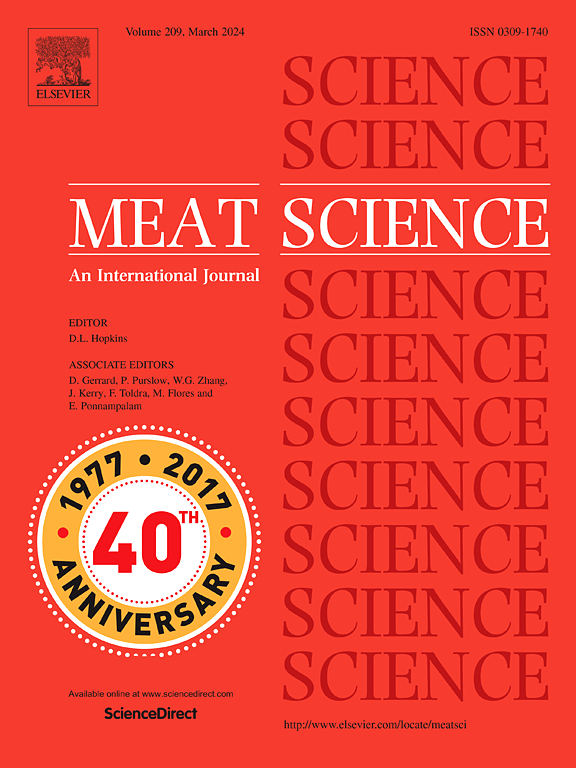Plant-based protein emulsions with soy protein isolate and gluten improve freeze-thaw stability and shelf life of pork meatballs
IF 7.1
1区 农林科学
Q1 Agricultural and Biological Sciences
引用次数: 0
Abstract
This study investigated the effects of oil-in-water emulsions used as fat substitutes on the physicochemical properties of meatballs during frozen storage. Different formulations of fat replacers were prepared, including pork fat as the control (C), oil and water (OW), oil-in-water emulsion (E), emulsion with soy protein isolate (SE), emulsion with gluten (GE), and emulsion with soy protein isolate and gluten (SG). These fat substitutes were applied to a meatball paste. The samples were stored at −18 °C for 30 and 60 days, and their physicochemical properties were analyzed after thawing at 4 °C for 12 h. The SE formulation had the highest values for both water content and liquid holding capacity during frozen storage (P < 0.05). SE, GE, and SG showed significantly higher hardness, cohesiveness, springiness, gumminess, and chewiness than those of E during storage (P < 0.05). The vegetable protein addition treatments maintained a compact structure throughout storage. SE, GE, and SG prevented lipid and protein oxidation during frozen storage. These results demonstrated that SE, GE, and SG offer significant advantages in improving the freeze-thaw stability, liquid holding capacity, and oxidation stability of pork meatballs during long-term frozen storage. Therefore, our study suggest that plant-based protein emulsions can effectively replace animal fats while maintaining product quality, offering valuable implications for the meat processing industry.
含有大豆分离蛋白和麸质的植物基蛋白乳剂可提高猪肉丸的冻融稳定性和货架期。
本研究调查了作为脂肪替代品的水包油乳剂在冷冻储存期间对肉丸理化性质的影响。研究人员制备了不同配方的脂肪替代品,包括作为对照的猪脂肪(C)、油和水(OW)、水包油乳剂(E)、含大豆分离蛋白的乳剂(SE)、含麸质的乳剂(GE)以及含大豆分离蛋白和麸质的乳剂(SG)。这些脂肪替代品被应用于肉丸糊中。样品在零下 18 摄氏度条件下分别储存 30 天和 60 天,在 4 摄氏度条件下解冻 12 小时后对其理化性质进行分析。
本文章由计算机程序翻译,如有差异,请以英文原文为准。
求助全文
约1分钟内获得全文
求助全文
来源期刊

Meat Science
工程技术-食品科技
CiteScore
12.60
自引率
9.90%
发文量
282
审稿时长
60 days
期刊介绍:
The aim of Meat Science is to serve as a suitable platform for the dissemination of interdisciplinary and international knowledge on all factors influencing the properties of meat. While the journal primarily focuses on the flesh of mammals, contributions related to poultry will be considered if they enhance the overall understanding of the relationship between muscle nature and meat quality post mortem. Additionally, papers on large birds (e.g., emus, ostriches) as well as wild-captured mammals and crocodiles will be welcomed.
 求助内容:
求助内容: 应助结果提醒方式:
应助结果提醒方式:


